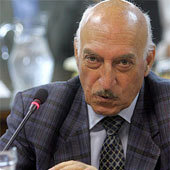Moscow-Washington Cooperation in 4th Resolution against Iran
Interview with Dr. Hermidas Bavand, university instructor and international relations experts

In order to make up for the crisis surfaced in its relations with the West and contain this trend, and to somehow return to the constructive talks, Moscow would use Iran’s nuclear program as a tool. As a result, Russia would continue its collaboration with the West and despite overwhelming speculations it would vote for the 4th UN Resolution against Iran.
Dr. Hermidas Bavand, university instructor and international relations experts further elaborates on this issue.
Russian President Dmitry Medvedev said Saturday that Moscow only supports negotiations over Tehran’s nuclear program. He added that the talks between Iran and the West, led by European Union Foreign Policy Chief Javier Solana, have been quite positive. "We should not adopt any additional sanctions now," he warned.
Iranian Diplomacy has sought the opinion of Dr. Hermidas Bavand, university instructor and international relations on the impacts of the recent tensions between Moscow and Washington on Iran’s nuclear case as IAEA prepares to issue its latest reports on Iran today.
Q: In view of the new differences surfaced between the US and Russia over Georgia, to what extent do you think these disputes would affect the 5+1 outlook about Iran’s nuclear case?
A: Until before the Georgian crisis, Russia maintained some type of strategic cooperation with the West over Iranian nuclear technology. Russia voted for the anti-Iran resolutions both at the IAEA Governing Board and at the UN Security Council. However, after the crisis in Georgia, Russian Deputy Prime Minister Sergei Ivanov announced that Moscow’s stance vis-à-vis Iran’s nuclear issue may be revised in the wake of the new developments. But I believe in order to make up for the crisis surfaced in its relations with the West and contain this trend, and to somehow return to the constructive talks, Moscow would use Iran’s nuclear program as a tool. As a result, Russia would continue its collaboration with the West and despite many speculations it would vote for the 4th UN Resolution against Iran. For Moscow, Iran’s nuclear program is an opportunity and a turning point for returning to the negotiation table and adjusting the current crisis with the West without paying any cost.
Q: What is your speculation about the next IAEA report on Iran’s nuclear program?
A: The IAEA reports are often double faced. While emphasizing that there was not enough evidence to prove Iran was trying to obtain nuclear weapons, the IAEA reports have always cited some ambiguities which required clarifications abd also mentioned Iran’s refusal to cooperate regarding inspection of certain military sites. It seems the new IAEA report (expected today) would be of the same nature. If the report is issued by the IAEA Governing Board it would be in compliance with the course taken on anti-Iran resolutions and would demand suspension of all uranium enrichment activities again. But if the report is issued by IAEA chief, considering that ElBaradei has announced he would not be seeking a 4th term as head of the agency, the report could be tilted more in favor of Iran and at the same time remain double edged.
Q: How do you see the future of Tehran-Moscow relations on the nuclear issue after the IAEA report Monday?
A: Russia’s cooperation with Iran on completion of Bushehr nuclear power plant and supply of long-range missiles is in fact using the Iranian card in its game with the West. In response to Washington’s opposition, Moscow by using the Iranian tool is in fact sending the message that it would step in a course completely rejected by the US. Of course, announcement of such a position does not necessarily mean its execution. It is more a showoff to make the West worried. Russia has not been committed to its obligations even regarding Bushehr nuclear power plant!. At the UN Security Council too, Russia would try to use its veto power to relatively mend its relations with the West

